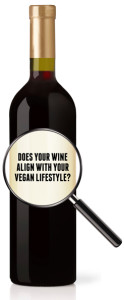By Leeann Froese Recently we came across a question the question posed was whether a wine is also vegan. And so we thought this provided a great chance to discuss...
 Most people might assume that all wine is vegan because, well, wine is made from grapes along with yeast to convert the sugars into alcohol. However, many wines are exposed to animal-derived products during production. It’s in the process called fining where the wine is clarified, by introducing a very small amount of protein to extract tiny bits of grape skin or stems, naturally occurring yeasts and various other particles. Typical fining agents are isinglass (fish bladder protein), albumen (egg white) and gelatin (animal protein). As the agent sinks down, the unwanted particles adhere to the agent.
Most people might assume that all wine is vegan because, well, wine is made from grapes along with yeast to convert the sugars into alcohol. However, many wines are exposed to animal-derived products during production. It’s in the process called fining where the wine is clarified, by introducing a very small amount of protein to extract tiny bits of grape skin or stems, naturally occurring yeasts and various other particles. Typical fining agents are isinglass (fish bladder protein), albumen (egg white) and gelatin (animal protein). As the agent sinks down, the unwanted particles adhere to the agent.
Fining makes wine clear and gives it a smooth texture. While none of the fining agents end up in the finished product sold in the bottle, some vegans deem wine that has undergone this process unfit to drink because the animal products have been used. On the flip side, some winemakers skip the fining process entirely or use alternative fining agents and allow nature to take its course. Bentonite clay, limestone and vegetable plaques are among some of the natural agents.
Now no one on our team is a winemaker, so if you, dear reader, have more knowledge than we do on the winemaking process, that would be no surprise. However another topic of vegan interest that our team has been discussing with clients and other wine lovers is the packaging.
We asked our own Andrew von Rosen, if a wine is vegan, can the package also be vegan? Andrew shares "even if a wine is vegan, it’s difficult to guarantee that a label aligns with veganism. First off," he says, "recycled paper can’t be considered vegan because it is unknown what the paper has touched (a harsh reality that stuns many tree-loving vegans – it's only vegan if you chop down a tree). Secondly," he continues, "on the back side of that label is glue – possibly an animal–based gelatin glue. Lastly," he adds, "while many inks are vegetable based – opposed to the petroleum based inks of a decades past – pigments that colour those inks may be made from insect or animal products."
So how would someone know if their wine is actually 'fully vegan'? There are a few resources online that list wineries and their wines that have been deemed vegan. See www.vegans.frommars.org/wine/ and www.barnivore.com for some examples.
Regrettably, most wine labels in Canada typically do not identify whether the wine is suitable for vegans or what fining products were used. Contacting a winery directly is a way to know if animal products were used in the winemaking, but it is very challenging to know if all aspects of the wine you’re buying including the label align with the vegan lifestyle.
